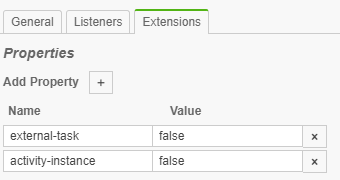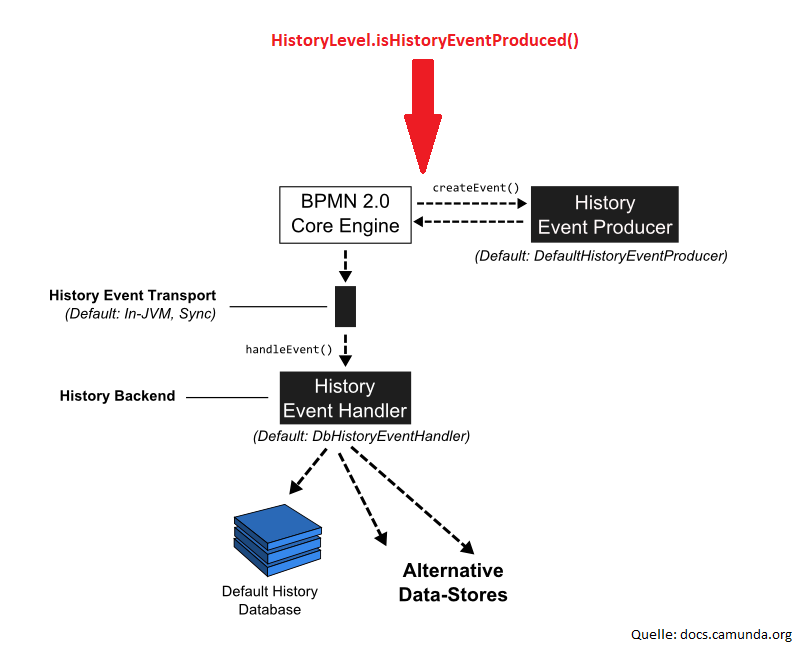Plugin to allow for object-specific configuration of Camunda BPM History on engine oder process-model level
This project shows a spring-boot-based Camunda BPM application which uses a custom, configurable HistoryLevel. This HistoryLevel is object-based and can be configured on engine or on process-model level.
To activate the plugin, you can check out the repository, build it locally and add the dependency to your pom.xml like this:
<dependency>
<groupId>info.novatec.bpm</groupId>
<artifactId>custom-camunda-history-level-plugin</artifactId>
<version>0.0.1-SNAPSHOT</version>
</dependency>Make sure to add the marker class to your component scan so the components get picked up by your application:
@ComponentScan(basePackageClasses = {EngineHistoryConfiguration.class, CustomHistoryLevelPlugin.class,
ProcessModelHistoryConfigurationParsePlugin.class})
public class CamundaApplication {
public static void main(String... args) {
SpringApplication.run(CamundaApplication.class, args);
}
}(This should be made easier in a future update).
In order to activate the custom history level, set it in you application.yml like this:
camunda.bpm:
history-level: customHistoryLevelYou may then specify the objects that are supposed to be saved to the Camunda History Database in the application.yaml under history.configuration:
history:
configuration:
process-instance: false
activity-instance: true
task-instance: true
variable-instance: false
incident: true
case-instance: true
case-activity-instance: true
decision: true
external-task: true
user-operation-log: trueThis will result in a default, enginewide configuration which will cause the HistoryLevel to include Activity Instances, Incidents etc. but exclude Process Instances, Variable Instances etc.
Additionally, you may specify similar properties in a .bpmn-file, either via xml:
<bpmn:extensionElements>
<camunda:properties>
<camunda:property name="external-task" value="false" />
<camunda:property name="activity-instance" value="false" />
</camunda:properties>
</bpmn:extensionElements>or via extension properties in the camunda modeler:
Properties that are set this way only apply to processes of the model they were defined in and always overwrite the enginewide configuration. If no configuration is done to an object type on process model level, the HistoryLevel falls back to the enginewide configuration.
The CustomHistoryPlugin and the ProcessModelHistoryConfigurationParsePlugin extend the AbstractProcessEnginePlugin-interface, causing them to be picked up by the camunda engine when the application context is loaded without further configuration. The CustomHistoryPlugin introduces the CustomHistoryLevel to the engine, which checks against the configuration whenever a HistoryEvent may possibly be produced. The HistoryLevel acts as a filter not for HistoryEvents, but for the calling of a HistoryEventProducer:
If CustomHistoryLevel.isHistoryEventProduced() returns false, the HistoryEventProducer is not invoked an no HistoryEvent is even handled by the HistoryEventHandler.
The CustomHistoryLevel relies on two configurations: the enginewide EngineHistoryConfiguration, and the process specific ProcessHistoryConfiguration. If an entity would create a HistoryEvent based on an entity, the HistoryLevel checks those configurations, with the ProcessHistoryConfiguration having priority.
Since the process definitions can only be identified by the process definition id, which is set upon deployment, but the history configuration properties need to be extracted upon parsing, the ProcessModelHistoryConfigurationParsePlugin registers two components: the ProcessModelHistoryConfigurationParseListener reads the properties upon parsing and deposits them with the process definition key, the ProcessModelHistoryConfigurationDefinitionIdMatcher the matches this key with the generated id upon deployment:
Built and tested against Camunda BPM version 7.10.0.
Does not allow process-model or definition-model specific filtering of decisions. This filter may only be applied on engine level. User operation log and batch operations currently not dealt with correctly (known issue).


